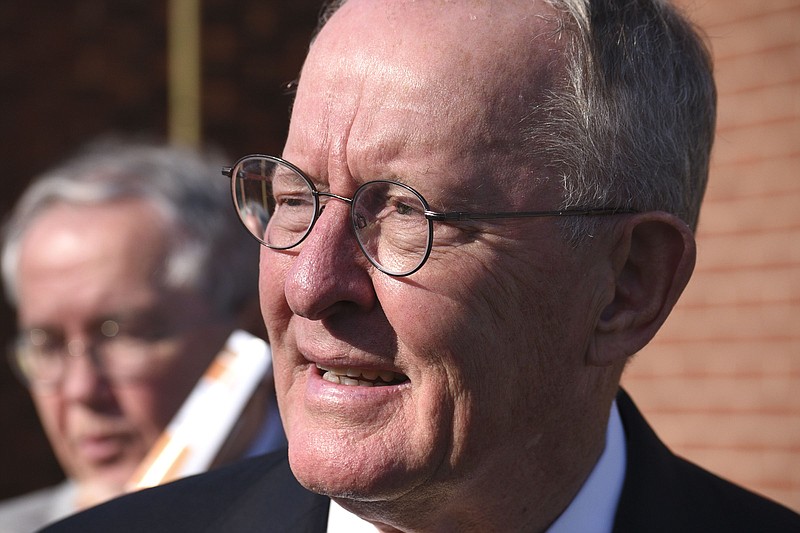Sen. Lamar Alexander, R-Tenn., held a figurative mirror in front of congressional Democrats earlier this week. If they had any self-respect, they would have paled at the image that stared back at them.
Our senior senator, tired of crafting repairs, fixes and bridges for the Affordable Care Act (ACA) and vexed that his party was being blamed for something it had nothing to do with creating, unleashed a measured tirade that every lawmaker across the aisle from him ought to have heard.
"About 10 days ago," Alexander said, "Sen. [Charles] Schumer came to the Senate floor and warned that very soon, health insurance companies will begin to announce their proposed rates for the year 2019 in each state across the country, and that when they do, many health insurance companies will propose rate increases. Today, several Democrat senators made the same charge. And of course they blame President [Donald] Trump and Republicans in Congress. It's a little like if you sold someone a house with a leaky roof and you tried to blame the new owner for that leaky roof."
Insurance rates have risen every year since the markets for the government-regulated health program began. For most of those years, the high double-digit increases were proposed when Barack Obama, the man under whom the health care law was created, was president. Trump only took office last year.
For one Tennessee farmer Alexander used as an example, rates have increased 176 percent since 2013, the year before the ACA marketplaces opened.
Indeed, Democrats have had a difficult time admitting they created a flawed system but take every opportunity to blame Republicans for the problems.
"Democrats built this house with a leaky roof," Alexander continued in his remarks on the Senate floor. "They built these individual insurance markets where no one can find insurance. They wrote the sloppy law and they failed to make the markets competitive, they erased the ability of consumers to have choice, they didn't follow the law when they paid out the cost-sharing reduction payments, and - this is the very worst - when Republicans hadn't reached agreement on repeal, and were prepared instead to stabilize these markets and lower premiums by as much as 40 percent next year - Democrats blocked our efforts. So not only are they complaining about the slow pace of repairs, they are blocking the repairs from happening."
Many insurance companies jumped at the chance to offer the government-guided policies after the health care law was passed in 2010. Why not? It meant more business for them and perhaps an opportunity - if consumers liked their product - to buy other insurance from them.
But the health care scheme never worked like it was planned. Young people never bought into it like the government expected. The cost for care for older people was higher. Insurance companies didn't receive the cost-sharing payments from the government as promised. In time, many of the companies were losing their shirt on that portion of their business.
So, insurance companies increased their rates to try to make a go of it. When they couldn't, one by one, state by state, they began dropping out of the program. Sure, the potential for the law's repeal last year and its changes this year have added to the volatility for insurance companies. But the increases remain more a function of the frailty of the law rather than what's happened since Trump was inaugurated.
Meanwhile, Alexander, with bipartisan support after four bipartisan hearings and four roundtables, offered three proposals that experts said would have shored up states, increased flexibility and lowered premiums. But Democrats blocked those measures from being included in a March omnibus spending bill.
"By their words and by their actions," he said in his address, "what Democrats really were saying was: 'We won't change one sentence of Obamacare, even parts that obviously are not working, and even when most of their caucus supports the changes.' ... Democrats could have worked with us to lower premiums by as much as 40 percent, but instead choose to cling to an unworkable law."
Alexander said there are further rules the Trump administration has or can propose to provide some flexibility to help lower premiums, but he suggested it is time the American people place the responsibility for the high cost of insurance premiums where it belongs.
"So if you have an insurance premium that is going up 40 percent next year, on top of an over 105 percent increase since 2013, you can thank a Democrat," he said.
"If you'd like greater choice, and the opportunity for lower premiums, you should support Republicans."
The statesmanlike Alexander is one who is rarely pointed about criticism, preferring instead to reach out and find workable, bipartisan solutions. But on this issue he'd repeatedly done just that and gotten doors slammed in his face.
The coda of his remarks should again make the point that it's important who governs.
